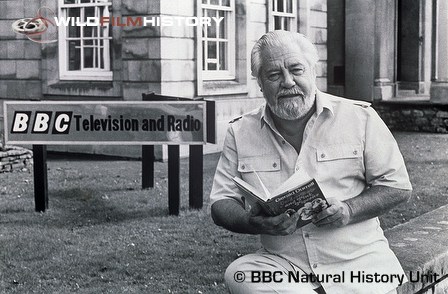WildFilmHistory Films
| Presenter, Narrator | |
| Presenter | |
| Narrator, Writer | |
| Presenter | |
| Screenplay, Script |

A pioneering conservationist and wildlife author, Gerald Durrell was born in India where he quickly developed a passion for animals and was often heard claiming his first spoken word was 'zoo'. Upon the death of his father, his family left India and settled in Corfu in 1935. Home schooled, Gerald's passion for the natural world grew, inspired by the works of French naturalist Jean Henri Fabre, and encouraged by his tutor and mentor, the Greek doctor, scientist, poet and philosopher, Theodore Stephanides.
World War Two saw the Durrell family move back to England and in 1945 Gerald joined the Whipsnade Zoo as a student keeper. In 1947 he used all his inheritance to finance his first expedition, joining ornithologist John Yellard on a trip to the British Cameroons (now Cameroon). Over the next ten years he travelled all over the globe collecting specimens for Britain's major zoological gardens.
Eloping with his first wife Jacquie in 1951, Gerald used the brief interludes between expeditions to launch a second career. Encouraged by his elder brother, novelist Lawrence, Gerald began to write about his animal adventures releasing his first book, The Overloaded Ark, in 1953. Gerald's witty and engaging style was hugely popular and in quick succession he released numerous other pieces including, in 1956, his best known work, My Family and Other Animals, the classic memoir of his childhood years in Corfu. At this time he also approached the BBC with some of his material, thus starting a long partnership that included numerous radio and television appearances.
After a long search for a suitable site, Gerald finally realised his childhood dream in 1959, opening the Jersey Zoological Gardens to house his growing menagerie. In 1963 Gerald was instrumental in turning the initiative into a charitable trust - The Jersey Preservation Trust (renamed the Durrell Wildlife Conservation Trust following his death). The same year saw the release of Two in the Bush, the first of several entire television series the BBC Natural History Unit devoted to his expeditions.
The Trust saw considerable success in the breeding and subsequent release of endangered species, and despite his early attempts being denounced by the zoological community Gerald is now recognised as one of the pioneers of captive breeding.
A tireless conservationist, Gerald published 37 books and appeared on television screens countless times, remaining active and prolific until his death in 1995. In 1981 he was appointed Officer in the Order of the Golden Ark, which is awarded to the world's most distinguished conservationists and in 1982 he was appointed OBE.
| Presenter, Narrator | |
| Presenter | |
| Narrator, Writer | |
| Presenter | |
| Screenplay, Script |